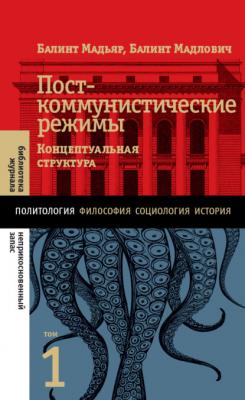Посткоммунистические режимы. Концептуальная структура. Том 1. Балинт Мадьяр
Чтение книги онлайн.
Читать онлайн книгу Посткоммунистические режимы. Концептуальная структура. Том 1 - Балинт Мадьяр страница 28
 style="font-size:15px;"> Offe C. Political Corruption: Conceptual and Practical Issues // Building a Trustworthy State in Post-Socialist Transition. Political Evolution and Institutional Change. New York: Palgrave MacMillan, 2004. P. 78.
style="font-size:15px;"> Offe C. Political Corruption: Conceptual and Practical Issues // Building a Trustworthy State in Post-Socialist Transition. Political Evolution and Institutional Change. New York: Palgrave MacMillan, 2004. P. 78.
42
North D., Wallis J., Weingas B. Violence and Social Orders: A Conceptual Framework for Interpreting Recorded Human History. Cambridge; New York: Cambridge University Press, 2009.
43
Hale H. Patronal Politics: Eurasian Regime Dynamics in Comparative Perspective. Cambridge: Cambridge University Press, 2015.
44
Hale H. Patronal Politics. P. 61–94.
45
Ibid.
46
Мадьяр Б. Анатомия посткоммунистического мафиозного государства: На примере Венгрии. М.: Новое литературное обозрение, 2016.
47
Hanson P., Teague E. Russian Political Capitalism and Its Environment // Varieties of Capitalism in Post-Communist Countries. London: Palgrave Macmillan UK, 2007. P. 149–164.
48
Magyar B., Madlovics B. From petty corruption to criminal state: A critique of the corruption perceptions index as applied to the post-communist region. Intersections // East European Journal of Society and Politics. 2019. Vol. 5. № 2. P. 103–129.
49
Stefes C. H. Understanding Post-Soviet Transitions: Corruption, Collusion and Clientelism. New York: Springer, 2006; Klíma M. Informal Politics in Post-Communist Europe: Political Parties, Clientelism and State Capture. Milton: Routledge, 2019.
50
Bokros L. Hanyatlás [Упадок] // Élet És Irodalom. 2015. Vol. 59. № 1–2.
51
Snyder T. The Road to Unfreedom: Russia, Europe, America. New York: Tim Duggan Books, 2018; Motyl A. Putin’ s Russia as a Fascist Political System // Communist and Post-Communist Studies. 2016. Vol. 49. № 1. P. 25–36; Ungváry R. A láthatatlan valóság: A fasisztoid mutáció a mai Magyarországon [Невидимая реальность: Фашизоидная мутация в современной Венгрии]. Pozsony: Kalligram, 2014.
52
Inozemtsev V. Neo-Feudalism Explained // The American Interest. 01.03.2011. URL: https://www.the-american-interest.com/2011/03/01/neo-feudalism-explained/; Heller Á. Hungary: How Liberty Can Be Lost // Social Research: An International Quarterly. 2019. Vol. 86. № 1. P. 1–22; Shlapentokh V., Woods J. Contemporary Russia as a Feudal Society: A New Perspective on the Post-Soviet Era. New York: Palgrave Macmillan, 2007.
53
См.: Szelényi I., Mihályi P. Rent-Seekers, Profits, Wages and Inequality: The Top 20 %. Cham: Palgrave Pivot, 2019; Roniger L. Political Clientelism, Democracy and Market Economy // Comparative Politics. 2004. Vol. 36. № 3. P. 353–375; Åslund A. Russia’ s Crony Capitalism: The Path from Market Economy to Kleptocracy. New Haven: Yale University Press, 2019; Dawisha K. Putin’ s Kleptocracy: Who Owns Russia? New York: Simon & Schuster, 2014.
54
См. пример метаанализа: Guliyev F. Personal Rule, Neopatrimonialism, and Regime Typologies: Integrating Dahlian and Weberian Approaches to Regime Studies // Democratization. 2011. Vol. 18. № 3. P. 575–601.
55
В анализе режимов, сделанном в рамках теории Вебера, об этом различи забывают. См.: Körösényi A, Illés G., Gyulai A. The Orbán Regime: Plebiscitary Leader Democracy in the Making. London: Routledge, 2020. Ср.: Szelényi I., Mihályi P. Varieties of Post-Communist Capitalism: A Comparative Analysis of Russia, Eastern Europe and China. Studies in Critical Social Sciences. Leiden; Boston: Brill Academic Pub, 2019.
56
Sartori G. Concept Misformation in Comparative Politics // The American Political Science Review. 1970. Vol. 64. № 4. P. 1033–1053.
57
Mair P. Concepts and Concept Formation // Approaches and Methodologies in the Social Sciences: A Pluralist Perspective. Cambridge; New York: Cambridge University Press, 2008. P. 186–192.
58
Bunce V., Wolchik S. Mixed Regimes in Postcommunist Eurasia // SSDD Working Paper Series. 2008. № 1. P. 5–9.
59
Coppedge M. Democratization and Research Methods. Cambridge: Cambridge University Press, 2012. P. 14.
60
Sartori G. Concept Misformation in Comparative Politics. P. 1033–1036.
61
Weber M. The Methodology of the Social Sciences. Illinois: The Free Press of Glengoe, 1949. P. 90.
62
Ibid.
63
Вебер М. Хозяйство и общество. Т. 1. С. 270.
64
Что именно представляют собой эти переменные и как они описываются отдельными сторонами треугольника, будет объяснено в Главе 7.
65
Skaaning S.-E.